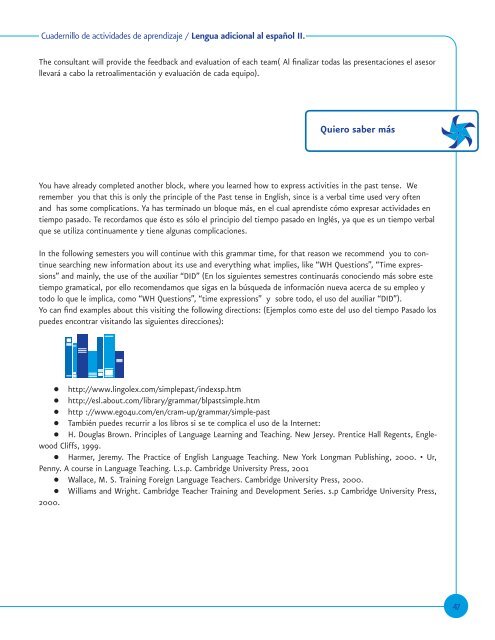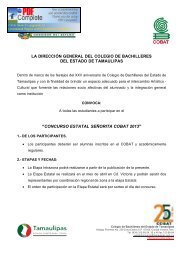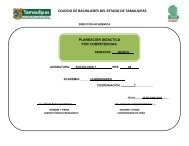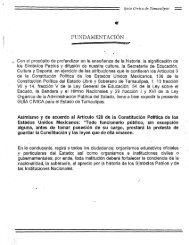Lengua adicional al español II Lengua adicional al ... - Cobat.edu.mx
Lengua adicional al español II Lengua adicional al ... - Cobat.edu.mx
Lengua adicional al español II Lengua adicional al ... - Cobat.edu.mx
Create successful ePaper yourself
Turn your PDF publications into a flip-book with our unique Google optimized e-Paper software.
Cuadernillo de actividades de aprendizaje / <strong>Lengua</strong> <strong>adicion<strong>al</strong></strong> <strong>al</strong> <strong>español</strong> <strong>II</strong>.<br />
The consultant will provide the feedback and ev<strong>al</strong>uation of each team( Al fi n<strong>al</strong>izar todas las presentaciones el asesor<br />
llevará a cabo la retro<strong>al</strong>imentación y ev<strong>al</strong>uación de cada equipo).<br />
Quiero saber más<br />
You have <strong>al</strong>ready completed another block, where you learned how to express activities in the past tense. We<br />
remember you that this is only the principle of the Past tense in English, since is a verb<strong>al</strong> time used very often<br />
and has some complications. Ya has terminado un bloque más, en el cu<strong>al</strong> aprendiste cómo expresar actividades en<br />
tiempo pasado. Te recordamos que ésto es sólo el principio del tiempo pasado en Inglés, ya que es un tiempo verb<strong>al</strong><br />
que se utiliza continuamente y tiene <strong>al</strong>gunas complicaciones.<br />
In the following semesters you will continue with this grammar time, for that reason we recommend you to continue<br />
searching new information about its use and everything what implies, like “WH Questions”, “Time expressions”<br />
and mainly, the use of the auxiliar “DID” (En los siguientes semestres continuarás conociendo más sobre este<br />
tiempo gramatic<strong>al</strong>, por ello recomendamos que sigas en la búsqueda de información nueva acerca de su empleo y<br />
todo lo que le implica, como “WH Questions”, “time expressions” y sobre todo, el uso del auxiliar “DID”).<br />
Yo can fi nd examples about this visiting the following directions: (Ejemplos como este del uso del tiempo Pasado los<br />
puedes encontrar visitando las siguientes direcciones):<br />
● http://www.lingolex.com/simplepast/indexsp.htm<br />
● http://esl.about.com/library/grammar/blpastsimple.htm<br />
● http ://www.ego4u.com/en/cram-up/grammar/simple-past<br />
● También puedes recurrir a los libros si se te complica el uso de la Internet:<br />
● H. Douglas Brown. Principles of Language Learning and Teaching. New Jersey. Prentice H<strong>al</strong>l Regents, Englewood<br />
Cliffs, 1999.<br />
● Harmer, Jeremy. The Practice of English Language Teaching. New York Longman Publishing, 2000. • Ur,<br />
Penny. A course in Language Teaching. L.s.p. Cambridge University Press, 2001<br />
● W<strong>al</strong>lace, M. S. Training Foreign Language Teachers. Cambridge University Press, 2000.<br />
● Williams and Wright. Cambridge Teacher Training and Development Series. s.p Cambridge University Press,<br />
2000.<br />
47





